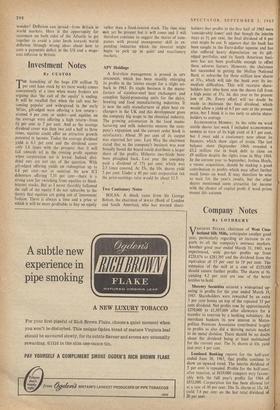Investment Notes
By CUSTOS THE launching of the huge £50 million 71 per cent loan stock by to (next week) comes conveniently at a time when many brokers are arguing that 'the cult of the equity' is ending. It will be recalled that when the cult was be- coming popular and widespread in the early 'fifties, gilt-edged were offering a low return— around 4 per cent or under—and equities on the average were offering a high return—from 61 per cent to 7 per cent. And as the average dividend cover was then two and a half to three times, equities could offer an attractive growth potential in income. Today the average dividend yield is 6.1 per cent and the dividend cover only 1.6 times with the prospect that it will fall towards nil in the coming profit squeeze when corporation tax is levied. Indeed, divi- dend cuts are not out of the question. With gilt-edged offering yields on redemption up to 6.8 per cent—not to mention the new ICI debenture offering 7.35 per cent—there is a strong case for switching from equities to fixed- interest stocks. But as I never slavishly followed the cult of the equity I do not subscribe to the theory that equities are going out of investment fashion. There is always a time and a price at which it will be more profitable to buy an equity
rather than a fixed-interest stock. The time may 'not yet be present but it will come and I will therefore continue to suggest the shares of com- panies with proved management skill in ex- panding industries which the investor might begin to pick up in quiet and reactionary markets.
APV Holdings A first-class management is proved in APV HOLDINGS, which has been steadily enlarging its profits in the 'sixties except for a 'slight set- back in 1963. Its staple business is the manu- facture of stainless-steel heat exchangers and complete liquid-processing units for the dairy, brewing and food manufacturing industries. It is now the only manufacturer of plate heat ex- changers in the UK and this development gives the company big scope in the chemical industry. The growing automation in the food manu- facturing and milk industries ensures the com- pany's expansion and the current order book is satisfactory. About 50 per cent of its output was exported last year. Last May the chairman stated that as the company's business was now broadly based the board could distribute a larger share of the profits. Hitherto two-thirds have been ploughed back. Last year the company paid a dividend of 17+ per cent, which was 2.3 times covered. At 35s. the 10s. shares yield 5 per cent. Under a 40 per cent corporation tax the price-earnings ratio would be about 11.3.
• - • Two Cautionary Notes BOLSA: A shock came from Sir George Bolton, the chairman of BOLSA (Bank of London and South America), who has warned share- holders that profits in the first half of 1965 were `considerably lower' and that though the interim stays at 3-} per cent, the final dividend of 6 per cent might be cut. It appears that the bank has been caught in the Euro-dollar squeeze and has also suffered heavy depreciation on its gilt- edged portfolio, and its South American busi- ness has not been profitable enough to offset these adverse factors. However, the chairman has succeeded in getting the Mellon National Bank to subscribe for three million new shares at 35s., which wilj tide the bank over its im- mediate difficulties. This will reassure share- holders here who have seen the shares fall from a high point of 37s. 3d. this year to the present low of 28s. Every effort will no doubt be made to maintain the final dividend, which would allow a yield of 6.7 per cent at the present price, but I think it is too early to advise share- holders to average.
ILLINGWORTH MORRIS: In the table on wool textile shares last week I included ILLINGWOR111 MORRIS in view of its high yield of 8.7 per cent, but I must add a cautionary note about its finances, which show signs of strain. The last balance sheet (September 1964) revealed a £3.2 million rise in bank debt to close on £9 million despite the rights issue in May 1964. In the current year to September, Joshua Hoyle, a recent acquisition, should be making a good contribution to profits -which may offset further stock losses on wool. It may therefore be wise to wait for the year's results, but the other shares mentioned seem attractive for income with the chance of capital profit if wool prices mount this autumn.






























 Previous page
Previous page